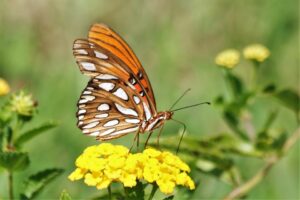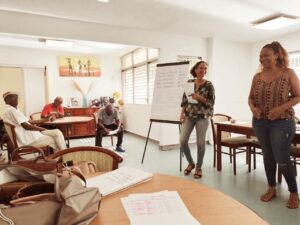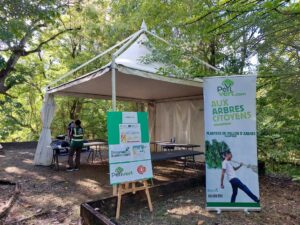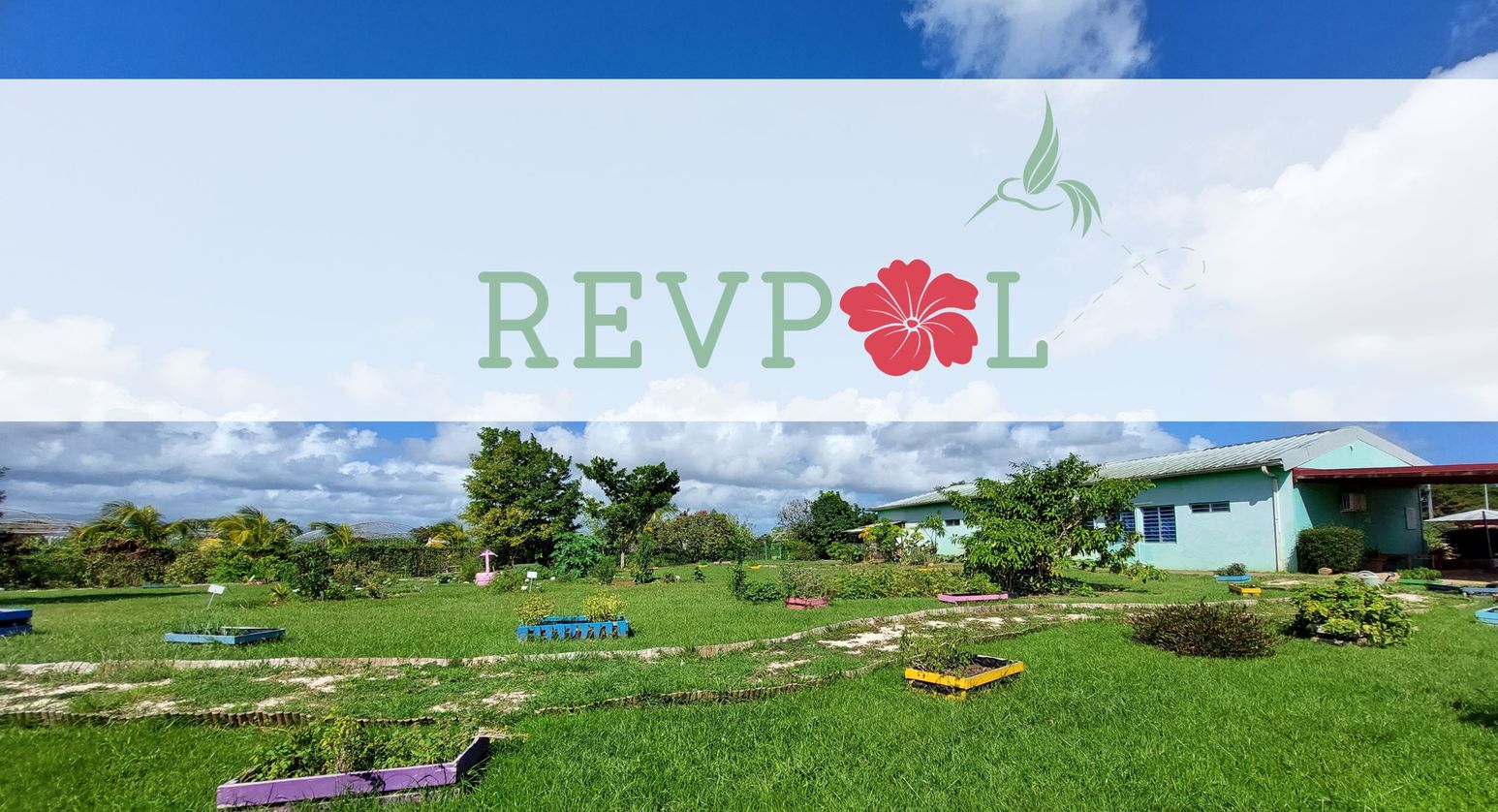Started just a year ago, the REVPOL project continues in Martinique and Guadeloupe. The main objectives remain the same: to enable managers of urban green spaces, both public and private, to act to protect local biodiversity by adopting revegetation strategies that favour local pollinators.
The team grew up during the year. In addition to the staff of Caribaea Initiative (program director, communication manager, administrative secretary), who also works on various projects, the REVPOL project benefits from two contractual agents responsible for the coordination and implementation of the actions: Claire Maurice-Madelon (project coordinator in Martinique) and Délisse Delannay (project manager in Guadeloupe).

Claire during a virtual meeting with the Municipal Council of Lamentin
During the first months, a significant part of the project was dedicated to its logistical implementation in the field, in particular via a selection of suitable sites. According to the objectives, which slightly differ between Martinique and Guadeloupe, some sites will be dedicated to observations, and others to the experimentation of new revegetation strategies, followed by observations on the frequentation of pollinators. Actions of revegetation and workshops to raise awareness of the inhabitants are also planned.
From an effective point of view, the project is divided into several axes: research, formulation of recommendations and raising awareness.

The butterfly Agraulis vanillae
The implementation of revegetation strategies specifically dedicated to local biodiversity requires good scientific knowledge. It is therefore necessary to study how plants, whether native or exotic, can influence the presence of pollinators. For this, Nathan Cyrille has started PhD research under the supervision of Prof. Bretagnolle, specialist in plant/animal interactions, and Dr. Perrot-Minnot, specialist in interspecific interactions. Based in Martinique since May 2022, Nathan studies the “Dynamics of plant-pollinator interaction networks on an urbanization gradient in Martinique – the case of private gardens and shared gardens”. Two master’s students have already helped him identify the processions of pollinators attracted by the different plant species, thus participating in the creation of a database on the floral traits of flowering plants and the observation of plant-pollinator interactions. Some of the selected sites, mentioned above, are involved in an inventory and analysis of the plant species they present (identification, status, morphology, floral syndromes, relative abundance, etc.). Other sites will be dedicated to a more experimental phase, with the establishment of plant assemblies specifically designed to increase the diversity of pollinators.
To support the team in scientific expertise, we can count on many partners. The Université de Bourgogne and the Université des Antilles allow the recruitment of students (doctorate, master). Among the other collaborations, we can cite the Conservatoire National Botanique de Martinique, which provides its expertise in the identification of local plant species, or the FREDON, which will provide expertise with regard to habitats and insects.

Délisse leading an awareness workshop in a seniors residence in Pointe-à-Pitre
On the administrative side, an agreement has been set up with the municipality of Lamentin in Martinique and that of Pointe-à-Pitre in Guadeloupe. These agreements will allow to obtain resources (human, organizational, logistical), a network of local actors and the provision of study sites. These conventions also facilitate the second axis of the project: the formulation of recommendations on the choice of plants and cultivation methods to favour pollinators. These recommendations will be addressed in particular to managers of green spaces and the staff of the municipalities, or even nurserymen, while revegetation projects will be implemented directly in the field, in partnership with the municipalities.

REVPOL exhibition during Péyi Vert tree donation day
Finally, raising awareness among various audiences about the importance of pollinators and the best practices to adopt to preserve them is the last of the main axes of the project. By now, several workshops and meetings already took place. In Martinique, the project was noticed during the Péyi Vert Tree Donation Day (a project aiming to plant one million trees in Martinique), during which REVPOL was presented. A nursery volunteered to supply plants native to the West Indies to the REVPOL project. In Guadeloupe, the proposal for awareness-raising workshops on differentiated management for the staff responsible for the management of green spaces in Pointe-à-Pitre has caught the full attention of the town hall, and should be quickly implemented. On both territories, presentations to the general public as well as workshops for primary and secondary school students have already been held, and others are still to be planned. Finally, the revegetation and maintenance of certain sites in Guadeloupe includes a strong participation of the inhabitants, in particular those from the sites associated with a school and a seniors’ residence.
One year after the start of the REVPOL project, the results are therefore positive. Adjustments were of course necessary, but everything is now in place so that the objectives are gradually met. The actions, like the results, should thus accelerate in the coming months.
The REVPOL project is conducted in collaboration with:

The REVPOL project is carried out with the financial support of the European Union – NextGeneration EU, France Relance and the Office Français de la Biodiversité, whose contribution amounts to €143,160.00, i.e. 82% of the total amount.

[French] REVPOL – Synthèse des objectifs et conséquences (PDF)

